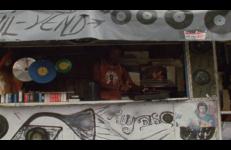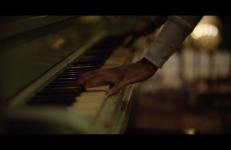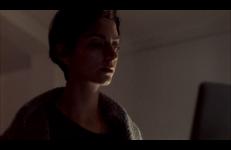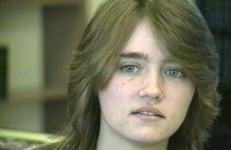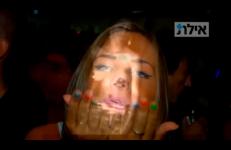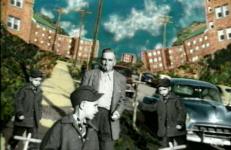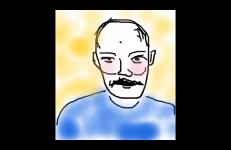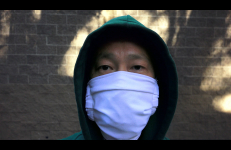Nine individuals visit the Santa Monica Mall and share their thoughts and feelings about love with Wendy Clarke and her camera. Love Tapes: Santa Monica Mall is part of Clarke's ongoing project, Love Tapes.
Memory
The Diaspora Suite
Filmed on location in Salvador, Brazil (the last city in the Western Hemisphere to outlaw slavery) and Harlem, NY ( an international stronghold of the African Diaspora), Many Thousands Gone draws parallels between a summer afternoon on the streets of the two cities. A silent version of the film was given to jazz multi-instrumentalist Joe McPhee to use an interpretive score. The final film is the combination of the images and McPhee’s real time “sight reading” of the score.
Memory Palace is a short video grounded in the personal history of the artist. A discovery of a photo album activates memories of physical spaces, which in turn open doors to reminiscences of past family life. Inspired by the classical method of loci, the film presents a woman — singer/songwriter Alice Smith — at work in Los Angeles.
A mirror reflects voiceless eyes with stories to tell, ‘stories’ about feet attempting to climb steps to "perfection"....."stories" about canvasses that are traps for a caged artist who’s paint brush needs colors that will be at peace with itself.
This title comprises Angels We (2015), Feathered Hearts (2015), and Flesh and the Stars (2018) which were compiled into this form by Mike Kuchar in 2022.
Morayngava: the “design of things.” Yngiru: the box of the spirits, the films, just like xaman dreams. This is how the Asurini define video, which has just arrived in their village. After discovering that it is possible to store their images, the old men lament that they never stored images of their ancestors and decided to register the initiation of a xaman, a tradition threatened by new times.
Directed by Virginia Valadão and Regina Müller.
In Assurini with English subtitles.
Morayngava: the “design of things.” Yngiru: the box of the spirits, the films, just like xaman dreams. This is how the Asurini define video, which has just arrived in their village. After discovering that it is possible to store their images, the old men lament that they never stored images of their ancestors and decided to register the initiation of a xaman, a tradition threatened by new times.
Directed by Virginia Valadão and Regina Müller.
In Assurini with English subtitles.
Morel's Yellow Pages focuses on secretive and destructive actions and image making. The title references The Invention of Morel (1940), Adolfo Bioy Casares’s science fiction novel, which informs the work. The artist brings together her research into the use of Baltra Island as an air base for the US army during World War II, and aerial surveillance photographs of the islands, using film footage, documents, and factual information collected during her trip to the Galápagos. Morel's Yellow Pages interweaves fact and fiction, covert and imagined activities.
Commissioned by Visual AIDS for STILL BEGINNING: The 30th Annual Day With(out) Art
A sound-essay set in the Tallahatchie County Second District Courtroom in Sumner, Mississippi, mythicPotentialities is an exploration of the event said to have galvanized the civil rights movement in America, the murder of Emmett Till, the trial that followed, and the way these event have been mediated through documentary text like Eyes on the Prize, The Murder of Emmet Till, and numerous other books, plays, poems and articles.
Theo Cuthand and his mother Ruth Cuthand have a candid conversation about Theo's last hospitalization for Bipolar Disorder in 2007. While Theo only knew his manic episode from the inside, Ruth had to deal with caregiving decisions and trying to find help. While they reminisce they also have to reckon with the feelings of animosity that arose between them during these events.
Co-directed with Ruth Cuthand.
A two part treatise on needs, met and unmet. A painter putters around his apartment. Spoils his cereal with rotten milk, gets a do-over with a fresh gallon. Over the course of the filming the relationship between the performer and the filmmaker unravels into disclosures of childhood sexual abuse. Rotten milk is the metaphor for all human suffering.
This is a story of friendship between two independent female artists and their body memories each willingly carry. In January 2020, New York based, interdisciplinary performing artist Eiko Otake arrived in Beijing to visit Wen Hui, a Chinese choreographer and filmmaker. Eight years apart, Eiko grew up in postwar Japan and Wen during the Cultural Revolution. They planned to visit each other for a month to converse and collaborate. The surge of COVID-19 abruptly cut off Eiko's visit and the pandemic has made Wen's visit to the USA impossible but the collaboration continued.
NOMADS at the 25 DOOR is presented in three chapters and based around a series of interviews between Finley and Mickey Yates, a 22-year-old woman serving a double life sentence in the Nevada Women’s Correctional Institution for the murder of her mother. Interweaving interview excerpts with footage of the upheaval in Eastern Europe, the tape explores the memory’s construction of an ephemeral homeland when a concrete one is lost, stolen or left behind.
... it's not what it used to be.
a personal album and homage, in my own way, to an influential film ... a closet-cleaning scrapbook of beloved photos and oddities ‐ and the gift of fire.
–– Ken Kobland
Notes for a DejaVu is a paramnesic experience of the images where Jonas Mekas still lives and we can hear him comment on the memory of an imaginary trip to Mexico. This film is shot with an expired 16mm celluloid during a popular protest. This is a movie that remembers. This is a political movie.
An experimental investigation into the use of race as an arbitrary signifier. Drawing upon language, personal memories and the 1959 text, Black Like Me, it deals with Lacan’s “mirror state” theories of beauty and the movement from object to subject.
A series of numbers that form infamous years that are uttered in a repetitive pedagogical litany. Ominous dates as a correlate of forgotten apolitical portraits. Portraits of a remembered royalty whose wealth was made possible by infamous times. Political faces accompanied by their corresponding dates. Peaceful figures whose placid portrait rests on the automated civilizational barbarism. This is part of the educational film cycle.
O, Persecuted turns the act of restoring Kassem Hawal’s 1974 Palestinian Militant film Our Small Houses into a performance possible only through film. One that involves speed, bodies, and the movement of the past into a future that collides ideology with escapism.
This surreal, free-form autobiography is concerned with childhood and adult rituals, and the longing for meaning and connection during the often wildly absurd events of early life. Obsessive Becoming returns to Reeves’s early exploration of personal narrative forms, poetry, and his interest in creating a more spontaneous and direct fusion between language and video. Words and images of the expectations and disappointments of coming of age break down the boundaries of both mediums.
A voice for which an event impossible to internalize remains distant. An event that in its distance does not cease to make the narration of something that should not take place anywhere foreign. The military massacre against unarmed students in 1968.
Made using voicemails the Kuchar brothers left on her home answering machine, the artist reveals George and Mike in all their candid honesty leading up to and following George’s untimely death in 2011. McGuire floats their voices along a river of digital scribbles and her own voice in singer/songwriter mode. The beauty of the piece lies partly in how the voicemails, used as-is and chronologically, contain an entire narrative about love and loss in a DIY style reminiscent of the Kuchars.
After unintentionally leaving a boy named Paulo out of his frame, middle-aged filmmaker Cam Archer ruminates on what else is missing, and how to split from what's familiar.
In okay bye-bye, so named for what Cambodian children shouted to the U.S. ambassador in 1975 as he took the last helicopter out of Phnom Phenh in advance of the Khmer Rouge, Rebecca Baron explores the relationship of history to memory.
1968 was the opening of the Summer Olympics in Mexico City, ten days after the massacre of students and civilians by military and police on October 2 in the "Plaza de las Tres Culturas, Tlatelolco."
A childhood experience is projected on a shadowy wall of a former movie theatre. A racist cinematic trauma passed between friends and family is remembered among the rustling of leaves and reflections of trees on an iPad screen. An essay about how past and present interrupt one another like movies being perpetually edited.





